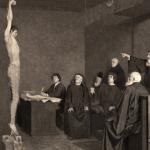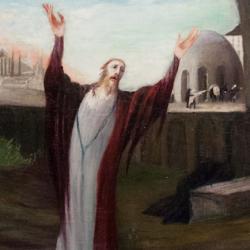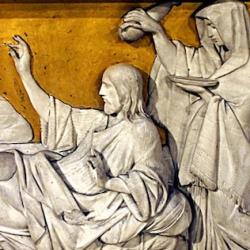The following excerpt is taken from the first volume of my Matthew commentary, recently published by Athanasius Press.
Jesus summoned the Twelve to Him and gave them authority and power (Matthew 10). He sent them out to the lost sheep of the house of Israel. He told them to proclaim the kingdom of heaven. He said that they would have power to heal, raise the dead, cast out demons, cleanse lepers. They didn’t even have to take any staff with them to ward off attackers or wild animals. They didn’t need any money; the Father who made the world from nothing could generate support from nothing.
They could pronounce peace to a house and a city, and the peace would remain. They could shake the dust from their sandals in a curse against a city, and that city would be judged more severely than Sodom and Gomorrah. The fate of the towns of Judah would turn on what they did to the Twelve and what the Twelve do to them.
Well into Jesus’ sermon, the Twelve are thinking, We’re going to be unstoppable. Nothing is going to stand before us. We’re like Joshua, before whom no enemy can stand. Then the tone of the talk changes. Jesus says “I sent you out as sheep in the midst of wolves.” No problem; we can take care of it; we’ve got power.
Jesus says, “They are going to take you to court, and before Gentile governors and kings.” A shadow falls across the Twelve’s enthusiasm. What happened to our power? they begin to ask, nervously. “Brother will deliver brother to death, and a father his child,” Jesus continues. And “don’t fear those who kill the body.” Who said anything about killing?? the Twelve begin to demand. We’ve got power, power from Jesus, power over demons, power of sickness, power over death, power over uncleanness. What is Jesus doing talking about wolves, and courts, and kings, murderous Cainite brothers, and death and killing? What did we get ourselves into?
Jesus gives power to the Twelve, power over sickness, uncleanness, death, and the devil. He does not give them the power to escape persecution. Persecution is integral to mission. There is no mission without it. Jesus said it already in the Beatitudes: We are blessed if we are persecuted, hated, slandered, and killed, because this is precisely what happened to the prophets. If we want share in the fullness of the blessing of the kingdom, we’re going to have to share in the sufferings of the King.
We follow a Crucified Messiah, and there is no way to follow Him or carry out His mission unless we share in the cross, unless we take up the cross and follow Him. Persecution, threat, opposition, and the possibility of death are integral to the mission of the Twelve because of the situation in Israel. The Twelve are sent to the lost sheep of the house of Israel, and they are sent because the sheep are harassed, discouraged, stomped down.
They are sent to be shepherds to those sheep. But Jesus also says that they are not above the sheep. In fact, they are sheep themselves (v. 16), sent out into an Israel full of predators, wolves who want to devour the sheep. Jesus has talked about wolves already in Matthew. At the end of the sermon on the mount, He warned the disciples about “false prophets, who come to you in sheep’s clothing, but inwardly are ravenous wolves” (7:15). They try to appear as sheep, but they are really sheep-eaters. Jesus goes on to say that we can know the wolves by their fruits. The wolves that act wolfishly are not sheep but wolves.
He is talking specifically about false prophets, but the image is broader too. He is talking about false teachers, false leaders, and even false disciples. But He is talking mainly about the false prophets and teachers of Israel. Jesus clearly has Jews in view in chapter 10 when He uses this image. The wolves are the ones who are going to deliver the Twelve to court and scourge you in “their synagogues” (v. 17). The wolves have synagogues. They are going to deliver the Twelve over to Gentile kings and their courts, where they will be called to testify.
As the story of the Twelve continues from here and into the book of Acts, we see the Jewish leaders doing exactly this – delivering the disciples to Gentile rulers. The Jewish leaders are the wolves. They’ve been preying on the sheep of Israel. That’s one reason why the sheep are lost and harassed. And the Twelve don’t come along to join the wolves. They identify themselves with the sheep, to suffer oppression and harassment alongside the sheep. Though shepherds, they have a shepherd. They are to stand with the oppressed rather than the oppressors.
Too often, the seductions of power have been too much for the church, and she has taken her stand with the wolves. Many in the hierarchy of Russian Orthodoxy lent their imprimatur to the Soviet regime, going along to get along, and many Protestants greeted Hitler like a second Messiah. Christians have joined with some of the most brutal regimes in history and given those regimes a patina of sanctity.
The church gives the most pious reasons. If we hang out with the thugs, perhaps we can moderate their thuggishness. Being with the thugs will give us an opportunity to witness to them. Maybe, in some rare cases this works. More often, Christians in these situations become useful idiots, and they aid and abet tyranny. Jesus will have none of this. The fact that liberation theologians say it doesn’t make it wrong: When the church enters a society polarized between the wolves and sheep, it is blindingly obvious that her place is with the latter. The church overcomes the wolves as Jesus did, by suffering alongside the sheep.
In this kind of situation, the disciples have to be shrewd. “Be wise as serpents,” Jesus says. The first wise serpent in the Bible is a deceiver. Is Jesus encouraging His disciples to use deception to protect themselves? In part, the answer is “Yes.” Paul escaped the ethnarch Aretas in a basket let down through a window in the wall of Damascus, and we can be certain that he didn’t inform Aretas of his plans beforehand.
Deception is a tactic of war, and the apostles were at war. When the disciples leave a town where they’ve been persecuted, they don’t leave a forwarding address. They slip out and go somewhere else. They might wear disguises, as Calvin had to do at times when he traveled. Behind these tactics of deception is an eye-for-eye justice. The serpent deceived Eve, and as a result Adam and Eve were cast from the garden. It’s just that Satan the deceiver be deceived. We receive Satan and Satanic oppressors as a strategy of protection, but also as an act of just retribution against Satan.
But there is more to the wisdom of serpents. Solomon observed that one of the four small things that are “exceedingly wise” was the lizard who can be grasped with the hands “yet is in kings’ palaces” (Proverbs 30:28). Reptiles are shrewd in their ability to slip into places designed to keep them out. This is the wisdom of Jesus’ serpentine disciples. Persecutors lay hands on believers, drag them before kings and governors, and – magically – Christians have slipped into king’s palaces, ready to speak a word inspired by the Spirit.
Through persecution, the mission to Israel will become a mission to the Gentiles. The Jews will not only “scourge you in their synagogues,” but will bring them “before governors and kings” (vv. 17-18). Without persecution, Jesus’ disciples would never gain access to Gentile rulers. The Twelve don’t have to prepare persuasive speeches; the Spirit will testify to the Gentiles through them (v. 20).
Jesus assures the Twelve that they will be delivered and vindicated when the Son of Man comes (v. 23). This isn’t a reference to the end of the world. Jesus is not saying that there will be a mission to the lost sheep of the house of Israel that will last from the first century to His final coming. When Jesus talks about the “coming of the Son of Man” in Matthew, He’s talking about something that happens within the lifetime of the apostles (cf. 16:24-28; 23:29-35).
Jesus is not just talking about a mission carried out in his own lifetime. He’s talking about a mission extending to the end of the age, not to the end of time. The mission of Israel has an endpoint, which is the coming of the Son of Man. This is the end-point of the mission to Israel. There will be a great crisis during that mission. The persecution of the Twelve and the other disciples will be a part of the birthpangs of the coming new age. Whoever perseveres with Jesus through that crisis will be saved (v. 22).
The mission to Israel, in other words, continues through the events that we read about in the book of Acts. Peter ministers to the circumcision, and Paul to the uncircumcision. But it’s not until the end of Acts that Paul finally turns from the Jews to the Gentiles. His mission among the Gentiles, as he explains in Romans 9-11, is designed to provoke Israel to jealousy. Though he preached the gospel to the Gentiles, his eye was always on Israel, to see how the Jews would respond. He worked among the Gentiles with the hope that all Israel would be saved.
Jesus tells the disciples to expect the same treatment as He received (vv. 24-25). So far, the opposition to Jesus has been fairly mild (9:34), but eventually He will be scourged (v. 17) and turned over to Gentiles (v. 18). Jesus’ trial and crucifixion set the pattern of Christian mission. This is scary. The world is a dangerous place, not only in first-century Israel but all around us today. We can’t sit safely in our enclaves. That would be unfaithful. We are sent out, as much as the Son and Spirit are sent out.
We are not saved and then sent out. Being saved means being caught up in a sending, the sending of the Son and Spirit. But it’s dangerous. We will face hatred, opposition, attacks from brothers and family members. So Jesus assures the Twelve that they have nothing to fear. Persecution is an essential aid to mission. Persecution is the mechanism for bringing secret things to light (vv. 26-27). Persecution is not an obstacle to mission but an opportunity for witness. Jesus tells the Twelve things in their ears. He whispers. He doesn’t slip into king’s palaces. But the Twelve will, and they will announce all that He has spoken. Jesus whispers, but the Twelve will shout.[1]
The fact of persecution itself reveals – it reveals the character of the persecutors, and it is a test of the character of the persecuted. The persecutors can’t do any more than kill the body. The Twelve should fear God’s judgment more than human judges (vv. 28). Our ultimate future is not determined by human authorities but by whether we confess or deny Jesus (vv. 32-33). The thought of God judging us seems frightening, but Jesus says it’s liberating. Because we fear God’s judgment, we have no fear of human authorities, no matter how vicious. The Father takes care of His children, more than He cares for sparrows (vv. 29-31).
“Not a single hair shall fall” is a common expression in the Bible (1 Samuel 14:45; 2 Samuel 14:11; 1 Kings 15:2), but Jesus doesn’t promise that. He promises that when our crown of hair falls to the dust, our Father knows it. Hair is glory and a crown, and losing hair means losing glory, being dishonored, being shamed, being driven to the dust. Instead of a crown, we have dust on our heads, the dust of mourning and defeat. None of this happens apart from the Father. He takes care of the birds of the air, and He will take care of us even when our crown is cast down to the ground.
There is a broader point here about the mission of the church. As the church goes about her mission, she doesn’t necessarily look powerful. She looks like a flock of sheep, not a pack of wolves. She is vulnerable and not just vulnerable but actually oppressed, attacked, arrested, tried. But Jesus is promising that the Twelve’s mission really is unstoppable. What looks like an interruption of mission – arrest and trial – is actually opening a door for mission – the word that the Twelve speak in the power of the Spirit.
What can stop this kind of mission? Arrest and trial? Hardly. That expands the mission to new territory. Execution? Not even that will help, because as Jesus says, the disciples are not to fear the ones who can kill the body but cannot kill the soul. The destiny of believers turns on whether they testify and confess Christ before men. If they do, then they will be confessed before the Father. If they don’t, Jesus will deny them.
It might seem that Jesus’ instructions about persecution undermine the power that He has given the Twelve. But that’s not true. He’s still talking about power and authority. He’s talking about the unstoppable power of the mission of the church, which is the mission of the Crucified.
[1] Whispers to shouts: This is the history of the church in a nutshell. A Pharisee traveling to Damascus is thrown from his horse and Jesus speaks to Him, and the mission to the Gentiles begins. A wealthy young man hears a sermon about giving up earthly goods, hears the call of Jesus, sells everything, and soon he’s surrounded by disciples who devote themselves to humble service in the growing cities of Europe. A lone monk agonizes over the opening chapter of Romans, Jesus whispers to Him, and He shouts out a Reformation.















